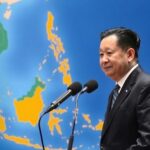Politics
ASIA, BEIJING, CHINA, DEFENSE, GEOPOLITICS, INDIAN OCEAN, IRRAWAD, IRRAWADDY, ISEAS - YUSOF ISHAK INSTITUTE, MEXICO, MIDDLE EAST, MIN AUNG HLAING, MOE THUZAR, MY, NATIONAL WAR COLLEGE, NORTH AMERICA, SINGAPORE, SOUTH CHINA SEA, SOUTH CHINA SEA DISPUTE, TERRITORIAL DISPUTES, YUSOF ISHAK INSTITUTE, ZACHARY ABUZA
Nia Simpson
West’s Response to China’s Role in Myanmar Conflict Continues to Evolve
On November 29, 2024, reports emerged that China may send security forces to Myanmar, fueling concerns of escalating the civil war while protecting its substantial investments estimated at €21 billion. China’s growing support for Myanmar’s military is highlighted amid fears of a U.S.-China proxy conflict, prompting calls for an enhanced U.S. response to this evolving geopolitical crisis.
On November 29, 2024, reports surfaced indicating that China may deploy security personnel to Myanmar amidst its ongoing civil war, further complicating the already volatile situation. This potential intervention is perceived as a strategy to safeguard China’s substantial economic investments in Myanmar, which approximate €21 billion and involve vital infrastructure projects such as a significant port along the Indian Ocean.
Beijing’s approach towards Myanmar has evolved following the military coup of February 2021 that ousted the democratically elected government led by Aung San Suu Kyi. Initially adopting a cautious stance, China has since intensified its support for the ruling military junta in response to the civil unrest that threatens its interests. Analysts, including Moe Thuzar from Singapore’s ISEAS-Yusof Ishak Institute, highlight that China’s involvement now is fundamentally aimed at protecting its strategic assets.
Recent agreements between the Chinese government and Myanmar’s military indicate plans for a joint security initiative where Chinese personnel would primarily focus on the safety of Chinese-owned enterprises. Such developments are particularly relevant given the increasing violence faced by these businesses, including a recent bombing of the Chinese consulate in Mandalay.
Critics argue that this military support may also afford the junta a false sense of security amid its struggles against various ethnic militias and pro-democracy forces. Zachary Abuza, a National War College professor, suggested that the invitation for foreign assistance signifies a profound weakness in military capabilities and could escalate the conflict further.
In light of these developments, the implications for U.S. and European foreign policy become increasingly significant. Experts urge the U.S. to avoid negotiations with the junta and instead bolster support for the resistance, asserting that the conflict could escalate into a proxy battleground between the U.S. and China. Recent articles emphasize the urgency of treating Myanmar’s situation as a critical issue for American strategic interests in the region.
The European Union, while imposing sanctions on junta officials, exhibits a more cautious approach compared to the U.S., concentrating on maintaining relations within the Association of Southeast Asian Nations (ASEAN). ASEAN’s internal divisions complicate a united front against Myanmar’s military, with some nations advocating for collaboration with the junta while others call for stricter measures.
The growing influence of ethnic militias poses a new set of challenges for China as well. Observers express concern that the success of these groups could ultimately undermine the junta’s power and stability within Myanmar, further destabilizing the border regions critical to Chinese interests. As such, China endorses the junta’s forthcoming elections as a potential resolution, although skepticism remains surrounding their legitimacy and effectiveness in addressing Myanmar’s deep-rooted ethnic conflicts.
The geopolitical landscape surrounding Myanmar has shifted dramatically since the military coup in early 2021. China’s historical relationship with Myanmar spanned mutual interests under civilian governance, marked by strategic investments and regional cooperation. Following the coup, Beijing faced the dilemma of supporting a junta that it did not initially endorse, simultaneously balancing ties with pro-democracy factions and various ethnic insurgent groups. With the intensified civil strife, China’s emphasis has shifted to protecting its economic stakes, increasingly favoring the military regime and fueling concerns about escalating regional instability and conflict dynamics that may draw in external powers like the United States.
In summary, China’s increasing military and economic support for Myanmar’s junta may exacerbate the country’s ongoing civil conflict while simultaneously reshaping regional power dynamics. As the West reacts, there is a crucial need for a unified and strategic foreign policy approach that recognizes Myanmar’s significance in the broader context of U.S.-China relations. The growing divide within ASEAN and China’s concerns regarding ethnic militias indicate that the trajectory of the Myanmar conflict poses not only local but also key international implications.
Original Source: www.dw.com








Post Comment